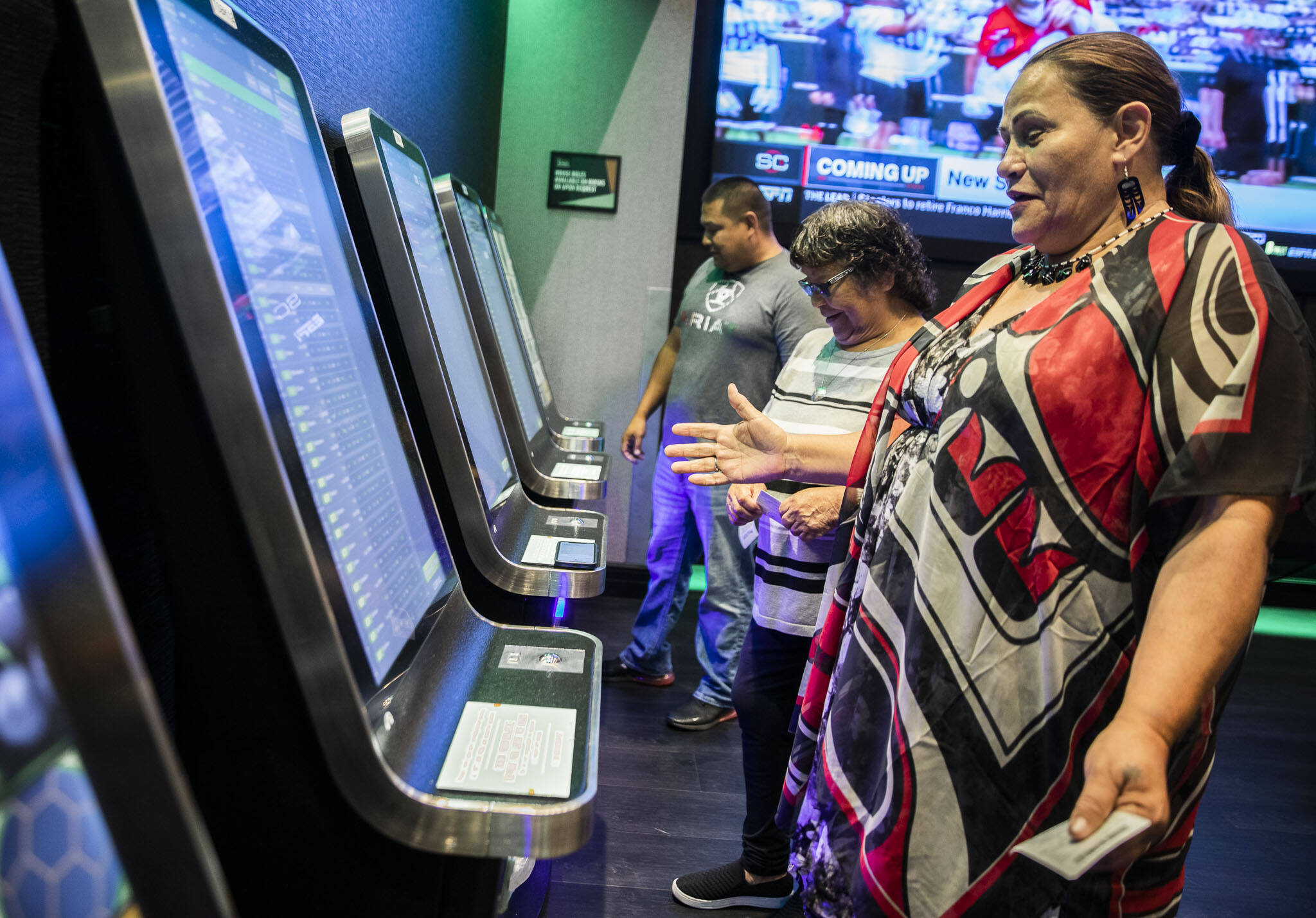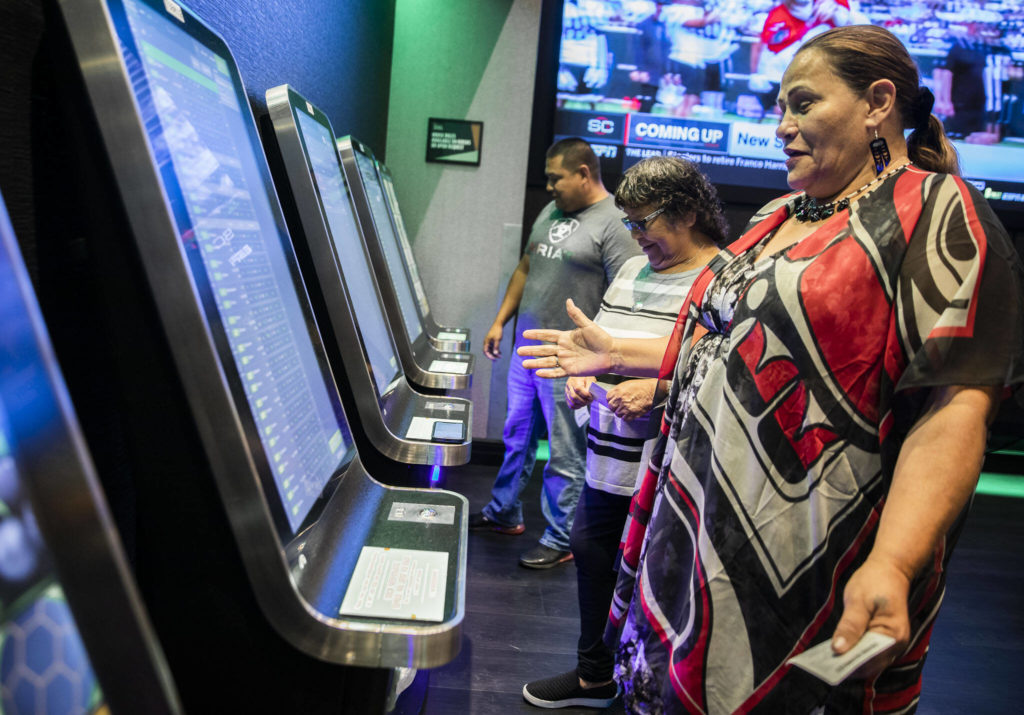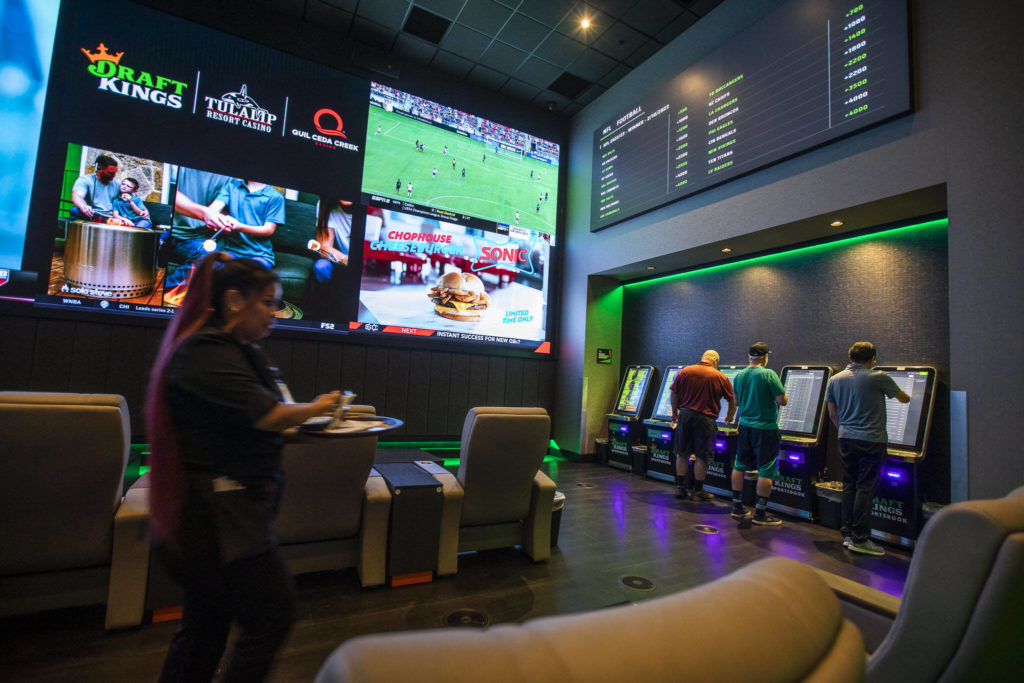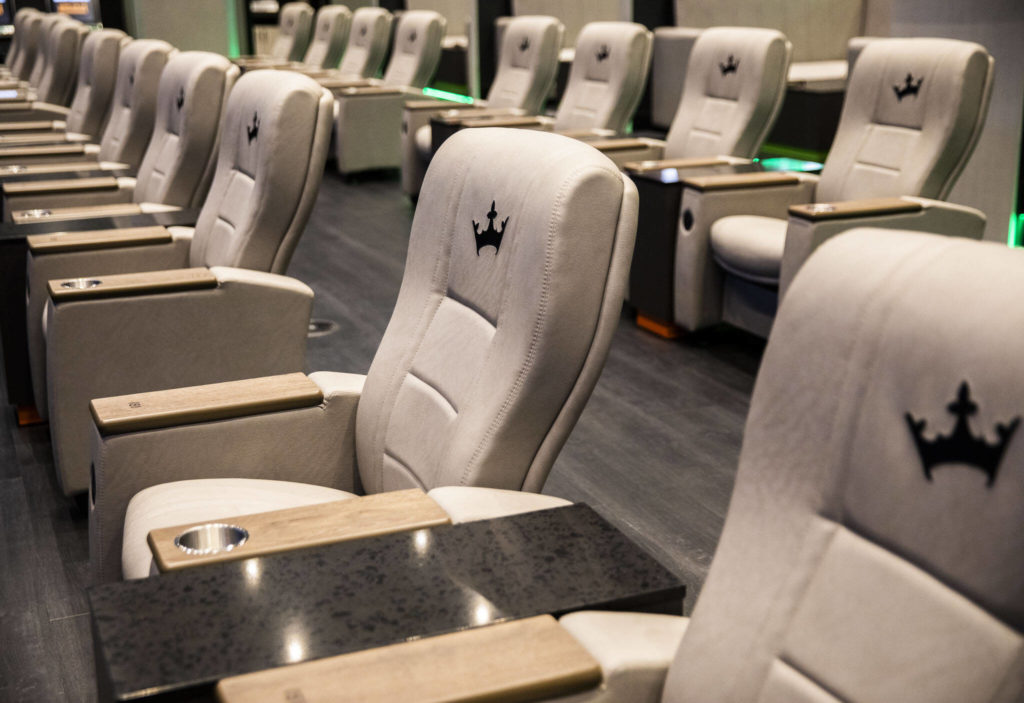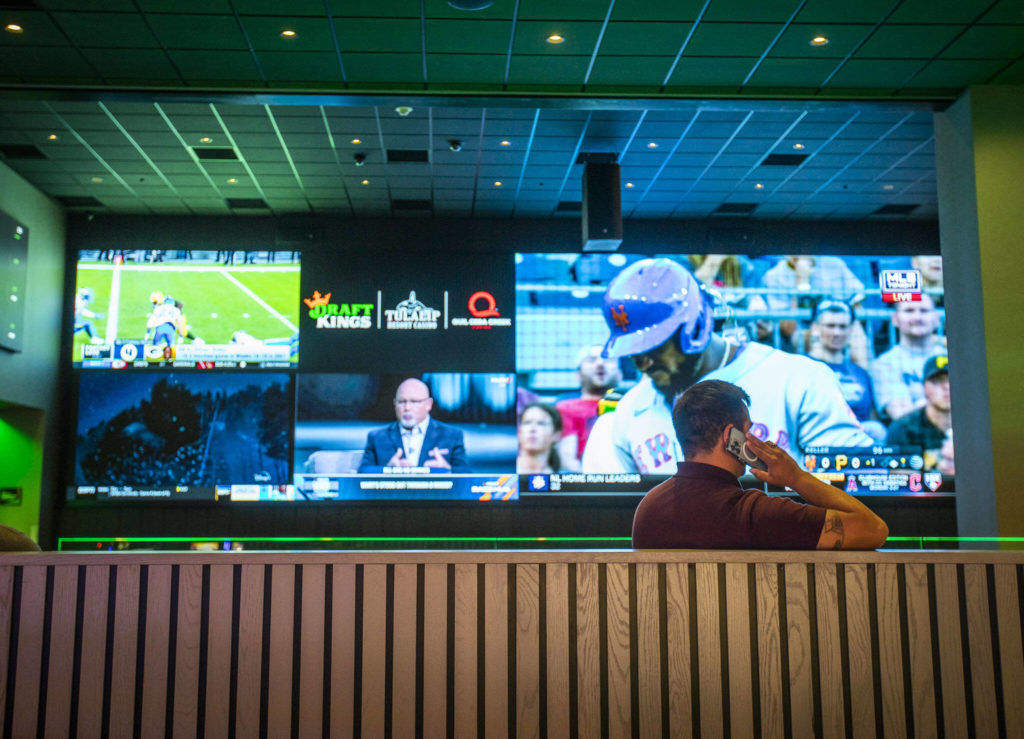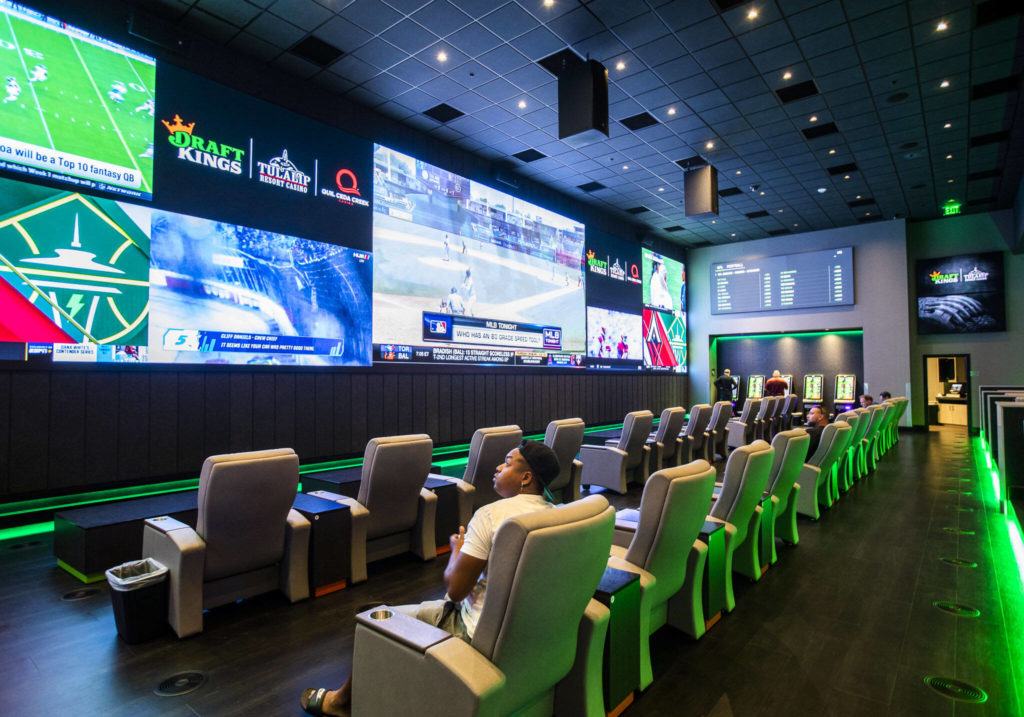TULALIP — “You all ready?”
Tulalip Tribal Chair Teri Gobin tapped “+240” on a touch-screen kiosk Tuesday afternoon to wager $10 on a Seahawks win over the Denver Broncos next week. Beside her, tribal councilmember Marie Zackuse was waiting for someone to help her get to the next screen.
Gobin laughed as her ticket printed, promising her a modest take-home of $24 if Seattle upsets Denver.
For Zackuse and Gobin, it was their first time placing sports bets, and fittingly, the first bets cast at Tulalip Resort Casino’s sportsbook. Tribal councilmember Hazen Shopbell, a slightly more seasoned sports better, seamlessly clicked through screens beside them.
Down the road, tribal councilmembers Debra Posey and Misty Napeahi were breaking in kiosks at a smaller sportsbook in Quil Ceda Creek Casino.
The Tulalip Tribes contracted with DraftKings to run sportsbooks at both sites. Though they announced the partnership in January, DraftKings did not obtain a license to operate the service in Washington until recent weeks.
“It’s good that we’re finally getting this open,” Gobin said.
The Tulalip Tribes became one of 19 federally recognized tribes able to offer sports betting under gaming compacts negotiated with the state and ratified by federal authorities.
The Snoqualmie Tribe became the first in the state to do so, opening a sportsbook at the Snoqualmie Casino a year ago.
In Snohomish County, the Stillaguamish Tribe’s Angel of the Winds Casino Resort opened The Book in December. Newly retired Seahawks star K.J. Wright will be at The Book at 2 p.m. Thursday to sign autographs, and possibly bet on the first NFL game of the season.
Gobin promised a “Tulalip-style” grand opening featuring big athletes — though she declined to drop names — at their sportsbook later this month.
It was a quiet start on Tuesday.
In an act of journalism, a Herald photographer put $20 on the Seattle Storm playoff game Tuesday evening, coincidentally against the Las Vegas Aces. A button illuminated in green: “Place Bet.” Pressing the button was pretty anti-climactic. The machine spat out a little ticket with a QR code. That code can help people track down their winnings.
Once the amateurs got out of the way, one Edmonds man placed 70 bets of $1,000. Soon, over a dozen kiosks beside him were full.
In the center of the sportsbook, dozens of gray leather theater-style style seats faced one immense screen spanning wall-to-wall.
On it were both live and recorded games. The University of Texas at El Paso football team was getting drubbed by No. 7-ranked Oklahoma. An athlete in gaming headphones was being interviewed on SportsCenter via Zoom. The Portland Timbers were seemingly upset about a referee’s call.
After placing their bets people flocked to the fancy chairs to check out the spectacle of a screen. Many of them were dressed as if they were getting ready to play the sports themselves: Nike shoes, Mariners caps and Kraken hats. It was transformed into a massive man cave.
Washington’s sports wagering law, passed in 2020, allows betting on professional, collegiate, international and Olympic sports, as well as esports. You cannot bet on college teams from Washington, however. And the law bars bets on minor league sports and high school or youth athletics.
Under the compacts, casinos can offer different options for placing bets. It can be done in the sportsbook environment or at a kiosk on a gaming floor, for example.
Also, some casinos will offer an ability to make bets from a mobile device when they are elsewhere on a casino property such as a hotel room, conference hall or entertainment venue attached to a casino. No wagers can be made on golf courses or in convenience stores not directly attached to a casino, under terms of the compacts.
Gobin said the tribes are working to set up a geofence, so people will soon be able to place bets on their phones in the casino and in the parking lot.
Legalized sports betting is a growing industry across the country, generating billions of dollars of revenues annually, according to the American Gaming Association.
In Washington, it could net $94 million of revenue a year to the tribal casinos, according to a 2021 study from Washington State University. That figure is the projection for four to five years from now, when sports betting is expected to be up and running in more tribal casinos. To generate that number, gamblers would need to wager in the neighborhood of $1.5 billion.
In Tulalip, much of that revenue serves tribal members through healthcare, early learning, and cultural programs. And over $1 million goes to Marysville School District.
Meanwhile, a legal fight continues in federal court to allow sports betting in non-tribal casinos and card rooms.
The lawsuit, filed by Maverick Gaming, a national gaming and entertainment company headquartered in Kirkland, seeks to invalidate gaming compact amendments concerning sports wagering. Maverick owns several card rooms in Snohomish County. The company alleges state officials provided tribal casinos an unlawful monopoly on sports betting.
Washington’s 2020 law legalizing sports betting does restrict it to tribal casinos.
Isabella Breda: 425-339-3192; isabella.breda@heraldnet.com; Twitter: @BredaIsabella.
Jerry Cornfield: 360-352-8623;
Talk to us
> Give us your news tips.
> Send us a letter to the editor.
> More Herald contact information.
